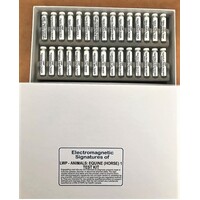LWP Animals: Equine (Horse) Test Kit
30 vials, boxed
Vial Size: 10 x 50mm
Box Type - White flat tray cardboard box with cell inlay structure for the vials.
Healthy and diseased tissues, virus, vaccinations and parasites.
| AE 01 | Kidney | Healthy Tissue | |
| AE 02 | Testicle | Healthy Tissue | |
| AE 03 | Uterus | Healthy Tissue | |
| AE 04 | Equine Melanoma | Tumour | The third most common type of skin cancer in horses. |
| AE 05 | Equine Sarcoid | Tumour | the most common skin tumour in horses and ponies and, although they may look like warts, they are locally destructive and are therefore considered by many vets as a form of skin cancer. |
| AE 06 | Equine Herpes | Nosode | Highly contagious. |
| AE 07 | Equine Toxoplasma | Nosode | Usually occurs without symptoms. |
| AE 08 | Glanders/Farcy | Nosode | Caused by infection with the bacterium Burkholderia mallei; symptoms include nodular lesions in the lungs and ulceration of the mucous membranes in the upper respiratory tract. The acute form results in coughing, fever, and the release of an infectious nasal discharge, followed by septicaemia and death within days. In the chronic form, nasal and subcutaneous nodules develop, eventually ulcerating. Death can occur within months, while survivors act as carriers. |
| AE 09 | Grease / Dermatitis Verrucosa / Seborrheic Dermatitis / Mud Fever | Nosode | Dermatitis of the heel that occurs in spring and autumn. |
| AE 10 | Equine Streptococcus | Bacteria | Causes Strangles, upper respiratory tract inflammation, a muco-purulent nasal discharge, and inflammation of the regional lymph nodes, followed by abscesses; highly contagious, and horses can be carriers and shed the infection, although they themselves may show no outward clinical signs. |
| AE 11 | Equine Herpesvirus 1 | Virus | Causes rhinopneumonitis; the most important viral cause of respiratory infection in foals; causes a lifelong latent infection in affected animals. |
| AE 12 | Equine Herpesvirus 4 | Virus | Causes rhinopneumonitis; the most important viral cause of respiratory infection in foals; causes a lifelong latent infection in affected animals. |
| AE 13 | Equine Papilloma Virus | Virus | Causes warts. |
| AE 14 | Equine Ehrliche Risticii Vacc | Vaccination | Vaccine against Potomac Horse Fever. |
| AE 15 | Equine Encephalo-Myelitis & Tetanus Vaccination | Vaccination | Equine Encephalomyelitis (Eastern,Western, Venezuelan, killed virus) & Tetanus Vaccine |
| AE 16 | Equine Flu & Tetanus Vacc | Vaccination | ProteqFlu |
| AE 17 | Equine Influenza (A1/A2) Vacc | Vaccination | Vaccine made from killed A1 and A2 strains of the equine influenza virus |
| AE 18 | Equine Rhino-Pneumonitis | Vaccination | Herpes 1/4"EquiVac EHV-1/4”) Equine Rhinopneumonitis vaccine made from killed strains of type 1 and type 4 viruses. |
| AE 19 | West Nile Equine Vaccination | Vaccination | |
| AE 20 | Anoplocephala Magna | Parasite | Tapeworm; In light infections, no signs of disease are present; in heavy infections, GI disturbances may be seen. Failure to thrive and anaemia may also occur. |
| AE 21 | Anoplocephala Perfoliata | Parasite | Tapeworm; In light infections, no signs of disease are present; in heavy infections, GI disturbances may be seen. Failure to thrive and anaemia may also occur. |
| AE 22 | Cyathostome Spp. | Parasite | May cause lethargy, sudden weight loss, debilitation, and diarrhoea. |
| AE 23 | Draschia Spp. | Parasite | Produces tumour-like enlargements filled with necrotic material and a large number of worms; the enlargements are covered by intact epithelium, except for a small opening through which the eggs pass. Rarely, these nodules rupture and cause fatal peritonitis. |
| AE 24 | Habronema Spp. | Parasite | Produces tumour-like enlargements filled with necrotic material and a large number of worms; the enlargements are covered by intact epithelium, except for a small opening through which the eggs pass. Rarely, these nodules rupture and cause fatal peritonitis. |
| AE 25 | Oxyuris Equi | Parasite | Chronically infected horses have a very poor appearance and may cause severe irritability and itching. Severe cases can lead to nervousness and anorexia. Rubbing and scratching at the perianal region cause irritation, dull hair coat, and loss of hair. |
| AE 26 | Strongylus Edentatus | Parasite | In mild cases can cause diarrhoea, weakness and anaemia if there is significant blood loss, and abdominal discomfort; in severe cases can show signs of having severe colic, rupture of the intestines, and death. |
| AE 27 | Strongylus Equinus | Parasite | In mild cases can cause diarrhoea, weakness and anaemia if there is significant blood loss, and abdominal discomfort; in severe cases can show signs of having severe colic, rupture of the intestines, and death. |
| AE 28 | Strongylus Vulgaris | Parasite | Common parasite; in mild cases can cause diarrhoea, weakness and anaemia if there is significant blood loss, and abdominal discomfort; in severe cases can show signs of having severe colic, rupture of the intestines, and death. |
| AE 29 | Trichostrongylus | Parasite | Produce a chronic catarrhal gastritis, which may result in weight loss. |
| AE 30 | Tridontophorus | Parasite | May cause ulceration of the colon. |
(TKanE)
| SKU | TKanE |
| Brand | Life Work Potential |
Be The First To Review This Product!
Help other Equilibrium Kinesiology Supplies users shop smarter by writing reviews for products you have purchased.



















